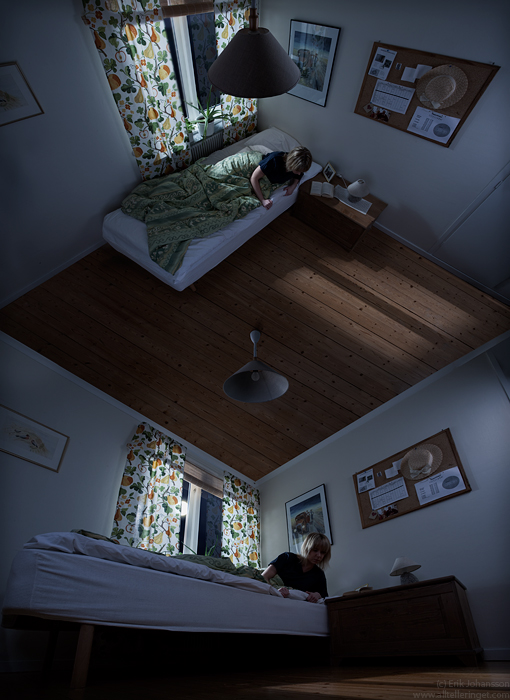 |
nightmare Perspectiveby alltelleringet |
Better Health Channel provided a short list of the definition of sleep deprivation, its causes and effects on a person. The list of causes is as follows:
- Personal choice – some people don’t realise that the body needs adequate sleep. Instead of regularly going to bed at a reasonable hour, they prefer to stay up late to socialise, watch television or read a good book.
- Illness – illnesses such as colds and tonsillitis can cause snoring, gagging and frequent waking, and have a direct effect on sleep by fragmenting it.
- Work – people who do shift work disrupt their sleep-wake cycles on a regular basis. Frequent travellers (for example, airline crew) also tend to have erratic sleeping patterns.
- Sleep disorder – problems such as sleep apnoea, snoring and periodic limb movement disorder can disturb the person’s sleep many times during the night.
- Medications – some drugs used to treat disorders such as epilepsy or attention deficit hyperactivity disorder (ADHD) can cause insomnia.
- The sleeping environment – sleep may be disrupted for a range of environmental reasons; for example, because the bedroom is too hot or cold or because of noisy neighbours or a snoring bed partner.
- Poor sleep hygiene – some people’s habits are disruptive; for example, drinking coffee or smoking cigarettes close to bedtime stimulates the nervous system and makes sleep less likely. Another common problem is lying in bed and worrying, rather than relaxing.
- Babies, older babies and toddlers – parents almost always experience sleep deprivation because their young children wake frequently in the night for feeding or comfort.
The authors states a study saying "More than 50% of shift workers complain of shortened or disrupted sleep and overall tiredness, with total amounts of sleep loss ranging from 2 to 4 hours per night." And for jet lag, they state that "Flight crews often experience disrupted circadian rhythms and sleep loss. Studies have documented episodes of fatigue and uncontrolled sleep (microsleeps) in pilots. Flight crew members tend to remain at their destination for a short period of time and therefore do not adjust physiologically to a new time zone and altered work schedule before they embark upon another assignment, further compounding their risk for fatigue."
People working in the graveyard shift and people working in a flight crew obviously are associated with sleep deprivation due to impaired circadian systems. But what about everyday people who do not work at these hours?
R. Morgan Griffin's article "6 Surprising Sleep Wreckers" enlists and explains what are could interrupt a person's sleep and feel tired in the morning. Some of these enlisted are obvious and some are not so obvious. He enlists
- Sleeping with pets
- Alcohol and nightcaps
- Undaignosed REGD — gastroesophageal reflux disorder, a condition in which the stomach contents leak backwards from the stomach into the esophagus (the tube from the mouth to the stomach). This can irritate the esophagus and cause heartburn and other symptoms.)
- Medicine, vitamins, and supplements
- Pain — including mild pain
- Being exhausted
- Sleep disorders
One night of missed sleep may not affect greatly on the person but continuous lack of sleep can make a person sleep deprived. Continuing with this unhealthy practice may lead to a person to suffer great effects of sleep deprivation.
